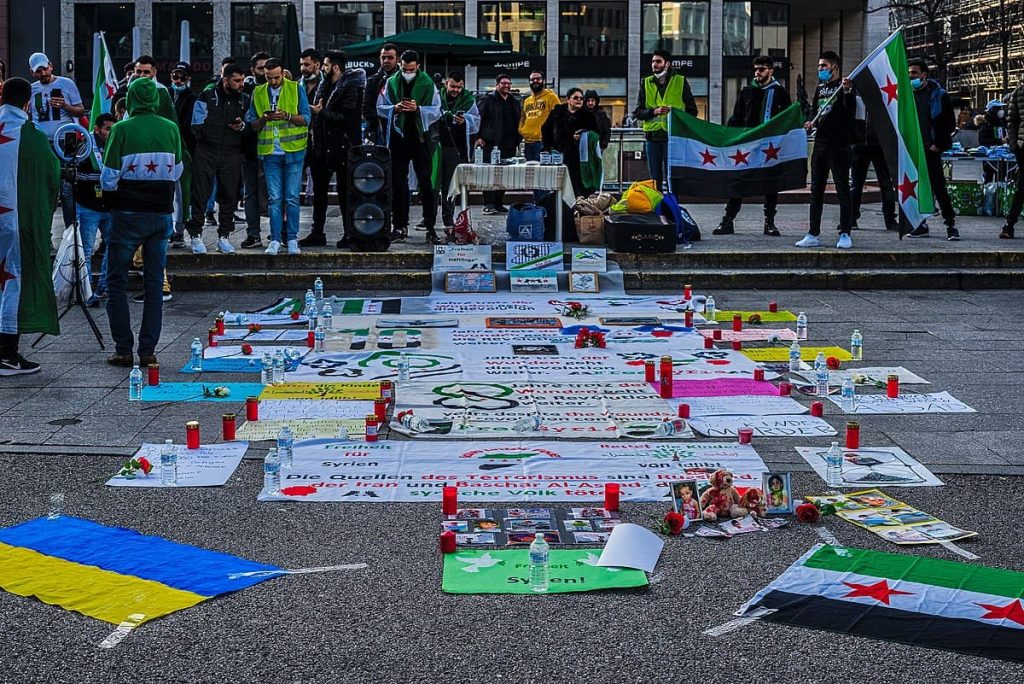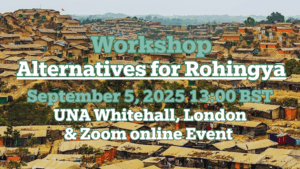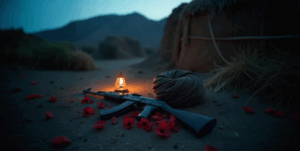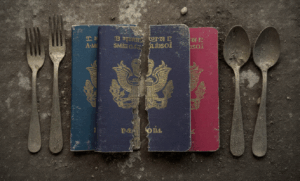
A blog by Eleftheria Kousta
When Russia went to war in support of the Syrian regime in 2015 it signaled what an armed intervention by an authoritarian government might look like. Now with the conflict in Ukraine feeding headlines daily with allegations of war crimes, questions linger on how best to approach issues of justice and accountability when belligerents blatantly violate the norms that are there to protect civilians.
Conflicts of the post-cold-war era have become protracted, hellish for civilians, and catastrophic for the protection of fundamental human rights. Recent efforts to hold perpetrators of war crimes accountable have focused on local military commanders in African countries, but have paid relatively little attention to the actions of external powers intervening in other states. Such work that has taken place has focused on the US intervention in Afghanistan and Iraq, while civil society groups in the UK, Australia and some other NATO countries have tried to mount cases relating to their own nationals. However, governments whose own domestic regimes display a bleak record for human rights are increasingly active in armed conflicts around the world. This is true both for illiberal governments, that exercise control over all aspects of the state and suppress all opposition like those of Russia, Saudi Arabia, the UAE, and Qatar and for smaller, isolated autocracies such as Eritrea.
Advocates of civilian protection have achieved some success in bringing to light violations by the US military and pushing for accountability and justice. Their efforts to change the military practice of the Pentagon have undeniably achieved more transparency and brought the US government to a position where it is obliged to be more communicative with the public regarding what it is doing in far-off lands. It has become more open to suggestions on how to improve its military practice while keeping the protection of civilians in mind. After investigative journalists from the New York Times looking into botched US airstrikes unveiled a pattern of negligence that cost the lives of many non-combatants, Defense Secretary Lloyd J. Austin III, ordered the military to strengthen its efforts to prevent civilian deaths and to improve the way it investigates and acknowledges claims of civilian harm in U.S. combat operations. Unfortunately, this welcome increase in openness to accountability has not yet extended to US allies such as the UK and Australia, although both governments are under considerable pressure from civil society groups.
When looking at the attitude of authoritarian governments, the record is even more depressing. Authoritarian states intervening in other countries are completely silent about their military activities and hostile to any effort to demand transparency regarding civilian harm and human rights violations committed by their own militaries or the armed factions that they support.
Why is it so difficult?
Firstly, there is little verified information on the activities of these states. In most instances, authoritarian regimes either outright deny their presence in foreign conflicts or cloak their operations in secrecy. A few civil society groups do document their operations. Notable work has been done on Syria by Airwars that has documented a decade’s worth of airstrikes by Russia or other groups such as SNHR who are following the actions of Moscow closely.
Military activities funded by authoritarian states are often delegated to paramilitary groups. Where the military involvement of a state is not confirmed, it is hard to collect the evidence that will prove their direct involvement in violations against civilians. For instance, the Kremlin-linked Wagner group is thought to be present in as many as 30 countries, with activity exploding on the African continent. Whilst the Russian government has been silent on the issue, only briefly mentioning bilateral security agreements, investigators and activists have documented many instances of violations against civilians by Wagner mercenaries. Civil society groups are still pushing for justice for a Syrian man, Mohammed Elismail, who was beaten to death and his body mutilated on camera by Wagner mercenaries in 2017, by filing a landmark case against the group. In the Central African Republic it has been reported to the UN that the Wagner group in conjunction with the government has committed torture, extrajudicial killings, sexual abuse and robberies against civilians in the areas where they operate.
Prosecuting mercenaries, paramilitaries, and private contractors from democratic countries for war crimes and crimes against humanity have been extremely difficult. But, in the case of authoritarian regimes, this becomes even more complicated given the lack of judicial independence and the obvious political disincentives to transparency. The case brought in the Moscow City Court on behalf of Elismail against Wagner mercenaries in Syria was deemed inadmissible.
Whilst limited information about such crimes is available to international audiences, almost nothing reaches the domestic population of authoritarian states, which can be unaware of what their government is doing if conscription and high soldier casualties are not occurring. It is also extremely difficult for domestic civil society to mobilise for anti-war efforts as that can expose these organisations to considerable risks. In Russia, very few voices have emerged that expressed concerns over Russia’s involvement in Syria and there is virtually no debate about it in the public discourse. Memorial, one of the few and most prominent Russian CSOs that did work on a report in April 2021, voicing their grievous discontent with what Moscow is doing & supporting in Syria, is about to be closed down by the authorities for their activities.
At the international level, accountability for war crimes and crimes against humanity can depend on which conventions countries have signed and their status in a war’s dynamics. Whilst Russia has acceded to the Geneva Additional Protocol II concerned with the protection of civilians in modern and more complex conflicts, it is not a member of the International Criminal Court (ICC). As it is also a permanent member of the UN Security Council able to veto referrals to the ICC, this makes it almost impossible to prosecute Russian citizens there. Other UN bodies are increasingly becoming influenced by authoritarian states, the 48th session of the UN Human Rights Council (UNHRC) saw the liquidation of a key fact-finding mission, for Yemen. The vote clearly reflected the polarisation within the council, where predominantly, authoritarian states moved to disrupt mechanisms seeking accountability for those violating protection norms.
Lastly, suspicion of the international community, especially after US-led missions of regime change in the multiple conflicts it has been involved in, has made progress in advocacy with authoritarian regimes extremely difficult.
What has been done so far
Most efforts to deal with the impact of authoritarian interventions have either focused on judicial and punitive measures, such as litigation with the ICC and harsh economic sanctions or, alternatively, move toward normalisation and diplomatic engagement through peacekeeping or peace-building missions in the Security Council and regional bodies.
The availability of these two contrasting options exposes an important clash of priorities between the demands for justice and a ‘pragmatic’ approach.
Those supporting the first option would prioritize accountability, justice, and the prosecution of those guilty of crimes. The second group is more inclined to negotiate humanitarian access to the affected areas and prioritise stability, even under an authoritarian regime, rather than risk wider geopolitical instability, mass deaths from starvation and siege warfare, or the loss of vital economic and strategic interests.
Given those competing notions about what is the right mode of engagement with the overall conflict, recent approaches to justice and accountability have been lacking in urgency and commitment.
The way forward?
So how do we fight back now that even more powerful entities have failed to bring authoritarians to account for their crimes?
Firstly, domestic activist groups and local civil society are often at the forefront of monitoring & documenting relevant information. In authoritarian states, activists put their lives in danger to bring information about war crimes to light. Yet, the daily parades of dead and dismembered bodies on the afternoon news have desensitized viewers in democratic countries to such horrors. Nevertheless, in some cases, these pictures and stories have reached a more empathetic populace that has taken to the streets in protest.
In authoritarian contexts, such information is not widely available and, if it is leaked, those responsible for the leak are very likely to be punished. Nevertheless, the small anti-war movement that emerged in Russia to challenge the wars in Syria and Ukraine was swiftly hacked by the government, which viewed it as particularly threatening, even though it did not become a mainstream protest as in the case of some campaigns on domestic issues.
So how can civil society movements in authoritarian states be assisted to educate and inform domestic audiences? What was special about the report Memorial produced, was not the originality of the content, as much of it had already been covered in other places, but the fact that a Russian group of researchers and human rights activists reached out directly to the Syrian people affected by their government’s policies. A people to people approach in the countries of the intervening state and of the country where the intervention is taking place can highlight the need for solidarity among the two oppressed groups, that are likely to have more in common with each other than with the people in power in their own countries or sympathetic observers in democratic ones.
Assisting and empowering local organisations in these countries by pursuing joint action, might not always yield the desired results but it can still lay the seeds for further action. The landmark Elismail case was brought by the Center for Media and Freedom of Expression (SCM), Memorial Human Rights Centre, and the International Federation for Human Rights (FIDH), a coalition of Syrian, Russian, and International advocates. These organisations engaged lawyers Ilya Novikov and Pyotr Zaikin to represent Elismail. Much of the information and evidence was provided to the human rights defenders by the Russian newspaper Novaya Gazeta, which conducted its own investigation.
Of course, the dangers posed to those who undertake such activities must not be underestimated, since Memorial is about to be closed down, but activists know that even with personal and organisational danger the work they do is still crucial and necessary and many international human rights groups are endeavoring to safeguard the activities of local CSOs and journalists by building some safety networks.
Secondly, states should be reminded of their obligations to ensure respect for international law. Groups and individuals that are not directly involved in efforts in authoritarian countries or in the countries where the crimes are perpetrated, can be encouraged to petition their national governments to keep the topic on the agenda and address it in international forums by insisting on their legal and international obligations. Article 1 of the Geneva Conventions of 1949 requires all state parties to those instruments to “respect and to ensure respect for the present Convention in all circumstances”.
Domestic audiences need encouragement and support to feel a sense of responsibility as citizens when the human rights and safety of civilians is compromised, even in faraway lands. Ultimately, demands for changes in government policies are one way to promote a sense of fellowship among oppressed peoples everywhere. This approach remains largely unexplored and has great potential.
Lastly, an alternative judicial avenue beyond the ICC may be the principle of universal jurisdiction whereupon national courts in different states use international law to prosecute those guilty of such crimes despite local laws in the state where those crimes were committed. By creating a hostile environment for those implicated in decision-making that results in civilian harm, a strong message is sent that impunity won’t be tolerated.
As missiles fall over the major cities of Ukraine and with evidence of Wagner soldiers waging combat all over the Sahel or with governments like that of Eritrean dictator Isaias Afwerki fueling ethnic conflict across lines and becoming accessories to mass atrocities like that we witnessed in Ethiopia, advocates should brace themselves and be ready to come up with lines of responses to such situations.











